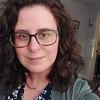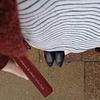Take a photo of a barcode or cover
This is a short, easily-readable book from a mistress of SF. Well done.
adventurous
dark
hopeful
reflective
sad
medium-paced
Strong character development:
No
Loveable characters:
No
Diverse cast of characters:
Yes
Flaws of characters a main focus:
Complicated
Le Guin writes so beautifully and creates a vivid world. I'm looking forward to reading more of this series. Loses one star as I felt the characters were a little bit flat.
Planet of Exile is not an Ursula K. Le Guin book I'd heard of before. I came on to my radar through my NoveList project, where I take my top ten lists from previous years and look for "read-alikes" on the Novelist database, then read them and compare them to the books that apparently sparked the association.
Note: The rest of this review has been withheld due to the changes in Goodreads policy and enforcement. You can read why I came to this decision here.
In the meantime, you can read the entire review at Smorgasbook
Note: The rest of this review has been withheld due to the changes in Goodreads policy and enforcement. You can read why I came to this decision here.
In the meantime, you can read the entire review at Smorgasbook
Stronger than [b:Rocannon's World|92610|Rocannon's World|Ursula K. Le Guin|https://d202m5krfqbpi5.cloudfront.net/books/1300039756s/92610.jpg|1357368], although probably only 3.5 stars, really.
Opening: "In the last days of the moonphase of Autumn a wind blew from the northern ranges through the dying forests of Askatevar, a cold wind that smelled of smoke and snow."
I had previously read the first book in this trilogy (Rocannon's World), and enjoyed it. I've been meaning to finish out the trilogy for awhile and finally picked this one up.
I wasn't sure if this would take place on the same world as Rocannon, and it's been long enough since I read the first book that I couldn't immediately tell. What we have here is an alternating narrative between the three main characters: Jakob Agat, one of the few Exiles left on this planet, Wold, the aging head of one of the native groups, and Rolery, one of Wold's daughters. Oddly enough, the main crisis of the book is that Winter is coming. I know, right?*
It's hard for me to say whether I liked this book. LeGuin has always tended to a detached style; understatement is most definitely the name of the game. When this works, it works very well (throughout Earthsea, for example) and provides a great antidote to more emotional styles. But here I think it veers into problematic territory. This is not just detached. Jakob and Rolery, ostensibly at the heart of the story, are almost completely devoid of interiority and even motivation. So their actions do not necessarily make sense because we are not given the basis to judge why they take place. There's an important plot point where I felt like I must have missed something because it seemed so random. Wold is probably the best characterized of the three, but he is old and forgetful and so the main impression I gained of him is a vagueness punctuated by moments of lucidity.
In part, I think this problem arises because LeGuin is fundamentally uninterested in the characters.** She wants to ask questions, about gender, about who constitutes humanity. The exiles think of themselves as human, but if they are adapting to the world, if they are losing the things that tied them to their ancestors, how human can they be? Will they become indistinguishable from the hilfs in another few generations? All these questions are interesting, but they presuppose that the reader will be more interested in them than the characters that bring them into being. I tend to read for character, and so I found this fairly aggravating.
In the end, I kept reading because, you know, it's LeGuin. And I'll probably read the third book for just that reason.
Book source: public library
Book information: Harper & Row, 1978; adult sci-fi
Ursula LeGuin, previously
* I actually haven't read Game of Thrones, and I gave up on the TV series after about two episodes, but I did catch enough to get some of the pet quotes.
** In this book, not in general.
I had previously read the first book in this trilogy (Rocannon's World), and enjoyed it. I've been meaning to finish out the trilogy for awhile and finally picked this one up.
I wasn't sure if this would take place on the same world as Rocannon, and it's been long enough since I read the first book that I couldn't immediately tell. What we have here is an alternating narrative between the three main characters: Jakob Agat, one of the few Exiles left on this planet, Wold, the aging head of one of the native groups, and Rolery, one of Wold's daughters. Oddly enough, the main crisis of the book is that Winter is coming. I know, right?*
It's hard for me to say whether I liked this book. LeGuin has always tended to a detached style; understatement is most definitely the name of the game. When this works, it works very well (throughout Earthsea, for example) and provides a great antidote to more emotional styles. But here I think it veers into problematic territory. This is not just detached. Jakob and Rolery, ostensibly at the heart of the story, are almost completely devoid of interiority and even motivation. So their actions do not necessarily make sense because we are not given the basis to judge why they take place. There's an important plot point where I felt like I must have missed something because it seemed so random. Wold is probably the best characterized of the three, but he is old and forgetful and so the main impression I gained of him is a vagueness punctuated by moments of lucidity.
In part, I think this problem arises because LeGuin is fundamentally uninterested in the characters.** She wants to ask questions, about gender, about who constitutes humanity. The exiles think of themselves as human, but if they are adapting to the world, if they are losing the things that tied them to their ancestors, how human can they be? Will they become indistinguishable from the hilfs in another few generations? All these questions are interesting, but they presuppose that the reader will be more interested in them than the characters that bring them into being. I tend to read for character, and so I found this fairly aggravating.
In the end, I kept reading because, you know, it's LeGuin. And I'll probably read the third book for just that reason.
Book source: public library
Book information: Harper & Row, 1978; adult sci-fi
Ursula LeGuin, previously
* I actually haven't read Game of Thrones, and I gave up on the TV series after about two episodes, but I did catch enough to get some of the pet quotes.
** In this book, not in general.
adventurous
emotional
hopeful
fast-paced
Strong character development:
Yes
Loveable characters:
Yes
Diverse cast of characters:
Yes
Flaws of characters a main focus:
Complicated




